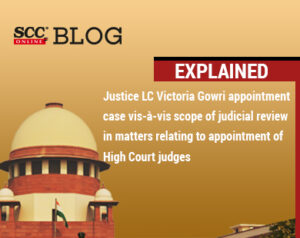Supreme Court: In the writ petitions filed by three Madras High Court lawyers opposing the appointment of Advocate LC Victoria Gowri as a judge of the Madras High Court, wherein the issue was relating to the scope and ambit of judicial review in the matter of appointment of judges to the High Courts under Article 217 of the Constitution of India, the division bench of Sanjiv Khanna and B.R. Gavai, JJ. said that when eligibility is put in question, the question would fall within the scope of judicial review. However, the question of whether a person is fit to be appointed as a judge essentially involves the aspect of suitability and stands excluded from the purview of judicial review.
The Court opined that, this legal issue is settled and is not res integra.
Placing reliance on Mahesh Chandra Gupta v. Union of India, (2009) 8 SCC 273, wherein it was held that appointment of a judge is an executive function of the President of India. Article 217(1) prescribes the constitutional requirement of consultation, where the fitness of a person to be appointed as a judge of the High Court is evaluated. Evaluation of the worth and merit of a person is a matter entirely different from eligibility of a candidate for elevation. While Article 217(2) prescribes the threshold limit or the entry point for a person to be qualified to be a judge of a High Court, Article 217(1) prescribes the procedure to be followed, which procedure is designed to test the fitness of a person so to be appointed; her character, her integrity, her competence, her knowledge and the like. The Court said that this judgment draws on the basic difference between eligibility and suitability.
It also said that eligibility is an objective factor which is determined by applying the parameters or qualifications specified in Article 217(2). Therefore, when eligibility is put in question, the question would fall within the scope of judicial review. However, the question whether a person is fit to be appointed as a judge essentially involves the aspect of suitability and stands excluded from the purview of judicial review.
Further, after referring Supreme Court Advocates-on-Record Assn. v. Union of India, (1993) 4 SCC 441 and Special Reference No. 1 of 1998, Re, (1998) 7 SCC 739, it is opined that judicial review lies when there is lack of eligibility or ‘lack of effective consultation'. Judicial review does not lie on ‘content' of consultation.
The Court for elaborating what is meant by the term ‘lack of effective consultation' referred to Supreme Court Advocates-on-Record Association (supra), wherein it was observed that it is necessary to spell out clearly the limited scope of judicial review in such matters, to avoid similar situations in future. Except on the ground of want of consultation with the named constitutional functionaries or lack of any condition of eligibility in the case of an appointment, or of a transfer being made without the recommendation of the Chief Justice of India, these matters are not justiciable on any other ground, including that of bias, which in any case is excluded by the element of plurality in the process of decision-making.
Moreover, the Court stated that after the Collegium of the High Court makes a recommendation for elevation, inputs are received from the intelligence agencies, which conduct a background check, and comments from the government are considered by the Collegium of the Supreme Court consisting of the Chief Justice of India and two senior most Judges.
It also stated that the opinion and comments of the Judges of the Supreme Court conversant with the affairs of the High Court concerned are called for in writing and placed before the Collegium. Invariably several shoot down and dismissive letters and communications from all quarters are received. Only thereafter, and on consideration, the Collegium of the Supreme Court take a final call, which is then communicated to the government.
The Court opined that, while exercising power of judicial review, it cannot issue a writ of certiorari quashing the recommendation, or mandamus calling upon the Collegium of the Supreme Court to reconsider its decision, as this would be contrary to the ratio and dictum of the earlier decisions of this Court.
Further, it stated that the person in question has been elevated as an Additional Judge of the Madras High Court. On taking oath, the person pledges to work as a judge to uphold the Constitution and the laws. Article 51A of the Constitution casts an obligation on every citizen, and more so on every judge, to promote harmony, spirit of common brotherhood among all transcending religious, linguistic, regional or sectional diversities. The principle of secularism and dignity of every individual — regardless of religion, caste or creed, is the foundation of Rule of Law and equal protection of laws. Not only is the conduct and judgments delivered considered at the time of confirmation, but a judge is also judged everyday by the lawyers, litigants and the public, as the courts are open, and the judges speak by giving reasons in writing for their decisions.
Thus, the Court dismissed the writ petitions
[Anna Mathew v. Supreme Court of India, 2023 SCC OnLine SC 131, decided on 10-02-2023]
*Apoorva Goel, Editorial Assistant has reported this brief.

